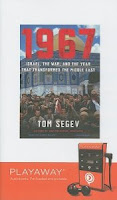Tom Segev : i soldati nel massacro del 1956 ritenevano ciò una "missione"
Sintesi Traduzione 1948:brutti ricordi HAARETZ.COM Soldiers in Kafr Qasem massacre believed they were doing the right thing – Tom Segev • Haaretz Jul 31 2022 https://archive.ph/s7vdD https://archive.ph/s7vdD I verbali del processo sul massacro di Kafr Qasem sono così scioccanti e sconvolgenti non perché rivelino informazioni sconosciute alla storia, ma proprio perché i crimini di guerra israeliani svolgono un ruolo così marginale nella formazione dei principi fondamentali dello Stato. Il Piano israeliano Hafarperet (Talpa), progettato per espellere gli arabi dal cosiddetto "triangolo" delle città arabe, è noto da 20 anni, da quando la persona che lo scrisse sotto le istruzioni dell'allora Capo di Stato Maggiore Moshe Dayan ne rivelò esistenza. Il suo nome era Avraham (Abrasha) Tamir, all'epoca capo della divisione operativa del Comando Centrale dell'IDF, che in seguito divenne un'anomalia nel mondo politico israeliano. L'idea alla base del Piano era...

